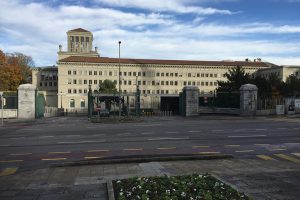By Ellyn Duke-Watson, Communications Assistant, IISD
The opening plenary of the International Institute for Sustainable Development’s (IISD) Trade and Sustainability Hub, convening alongside the Twelfth Ministerial Conference (MC12) of the World Trade Organization (WTO), considered the various crises the WTO faces today, including the COVID-19 pandemic, increasing food insecurity, geopolitical tensions, and climate change, and how these challenges affect developing and least developed countries (LDCs).
The event themed, ‘Navigating a Perfect Storm at the WTO,’ took place on 13 June and was moderated by Nathalie Bernasconi-Osterwalder, Executive Director, IISD Europe, and Alice Tipping, Lead, Sustainable Trade and Fisheries Subsidies, IISD.
Arancha González Laya, Dean, Paris School of International Affairs, kicked off the discussion by examining the kind of response the WTO should provide in the face of today’s challenges. “The risk we face is essentially fragmented responses,” she said, which will have a disproportionate impact on those who have less of an ability to respond to the multiple crises. González Laya hoped that the WTO sends a signal to members that they have a responsibility to deliver multilateral results. “Let’s keep WTO members accountable to what they agreed to do which is to make sure that trade works for people, prosperity and the planet.”
Many developing economies that worked hard to participate in the multilateral trading system may soon find it no longer exists.
Josefa Leonel Correia Sacko, Commissioner for Rural Economy and Agriculture, African Union (AU), discussed what the food security crisis means for Africa. Against a backdrop of climate shocks and supply chain issues, Sacko outlined two strategies to build a resilient sustainable agri-food system on the continent:
- Consolidating greater food production, as with 60% of the world’s uncultivated arable land, Africa has a suitable climate to produce its own food and achieve “food sovereignty”; and
- Reducing import levels, to become less vulnerable to supply chain disruptions, such as recent disruptions in fertilizer imports from the Russian Federation and Ukraine.
Carlos Correa, Executive Director, South Centre, discussed the tensions related to the response of the WTO during the pandemic. He said developed countries saw COVID-19 as an opportunity to promote exports of goods and services, “which we know does not benefit all developing countries.” Correa stressed that the promotion of the Trade Facilitation Agreement also favored exports from developed countries, and the attempt to coordinate export restrictions in the supply of vaccines to developing countries restricted developing countries’ response to the pandemic.
Tancrède Voituriez, Senior Research Fellow, Institut du Développement Durable et des Relations Internationales (IDDRI), examined how trade policy is responding to the challenges of environmental degradation. He said the proliferation of environmental initiatives with trade implications leaves open the question of the possible overlap between trade institutions and environmental institutions when it comes to setting common agendas. Highlighting the WTO as a “natural candidate” to serve as a forum for discussions on trade dimensions of climate action and biodiversity protection, he stressed the need to “connect the dots” and come up with a common doctrine agenda and action plan on trade and environment initiatives.
Mona Paulsen, Assistant Professor, London School of Economics and Political Science, discussed the impact of Russia’s invasion of Ukraine on the WTO. She outlined a scenario where the Russian Federation continues to be a part of the WTO, but sanctions become irreversible, leaving some members refusing to grant Russia “basic WTO treatments” on the grounds of security. This, Paulsen said, could potentially leave Russia and its trading partners with asymmetric benefits from the WTO agreements as compared to much of the WTO membership. She warned that should the global economy fracture into competing blocs, developing countries would be forced to pick sides, which would impose higher costs on the lowest-income regions. “Many developing economies that worked hard to participate in the multilateral trading system may soon find it no longer exists,” she said.
Rashid Kaukab, Executive Director, CUTS International, offered thoughts on the topic of the digital divide. He argued the digital divide can be chalked up to three major factors:
- Lack of developing country participation in trade agreements;
- Lack of developing country access to “hard” and “soft” infrastructure such as knowledge and skills; and
- Lack of emphasis on unity in the trading system’s agenda for digitalization to achieve a more prosperous world with opportunities for all.
IISD’s second Trade and Sustainability Hub convened virtually, from 13-15 June 2022. [IISD Knowledge Hub Sources]

